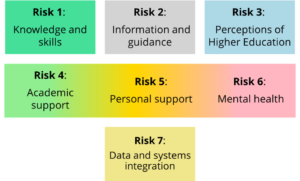Our risks to equality of opportunity
We identified seven key risks to equality of opportunity through data analysis from the Office for Students’ APP dashboard, the National Student Survey, and internal sources. Collaborating with the County Head of 6th Form Network, APP Steering Group, APP Operations Group, and student representatives ensured these risks are realistic. Addressing them will help us create a more inclusive environment, supporting every student’s success.

Figure: A diagram illustrating various risks, each represented by a coloured box with black text.
(Image long-description: Top Row: 1. Green Box: Heading: “Risk 1:” Description: “Knowledge and skills”. 2. Gray Box: Heading: “Risk 2:” Description: “Information and guidance”. 3. Light Blue Box: Heading: “Risk 3:” Description: “Perceptions of Higher Education”. Middle Row (with a gradient background to illustrate interconnected risks): 1. Gradient from Light Green to Yellow Box: Heading: “Risk 4:” Description: “Academic support” 2. Gradient from Yellow to Light Orange Box: Heading: “Risk 5:” Description: “Personal support” 3. Gradient from Light Orange to Light Pink Box: Heading: “Risk 6:” Description: “Mental health”. Bottom Row: 1. Light Yellow Box: Heading: “Risk 7:” Description: “Data and systems integration”)